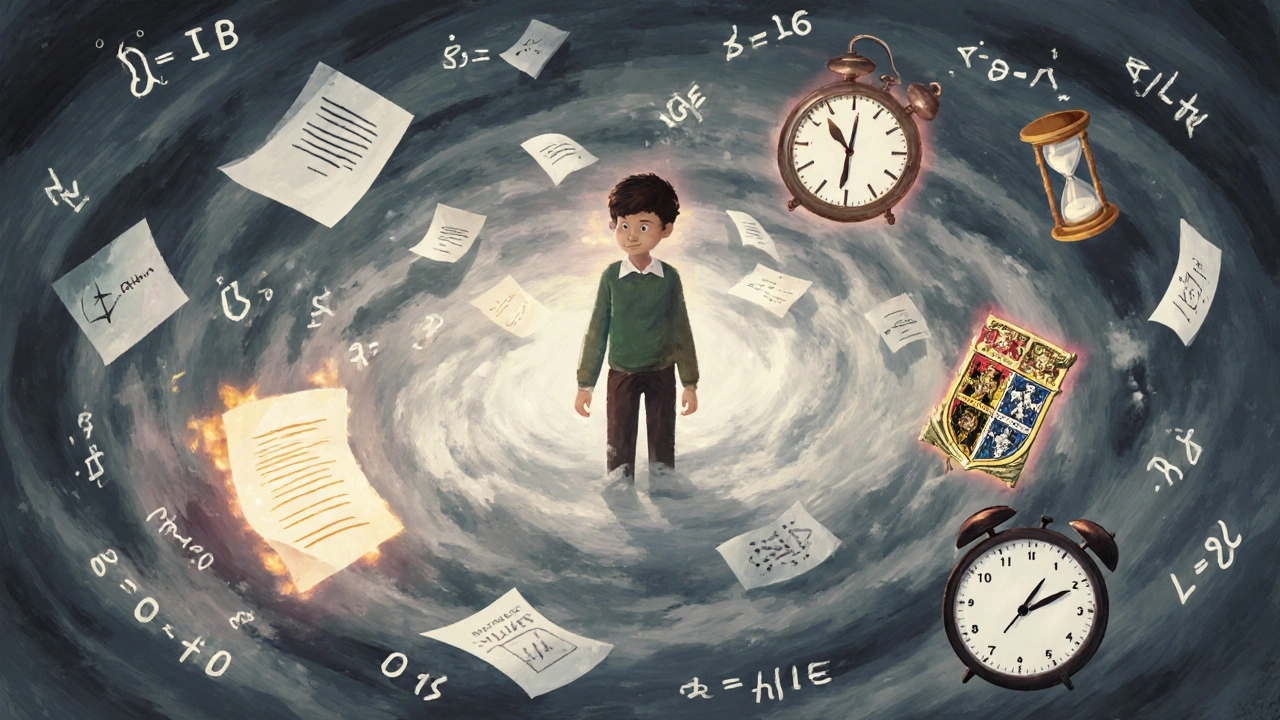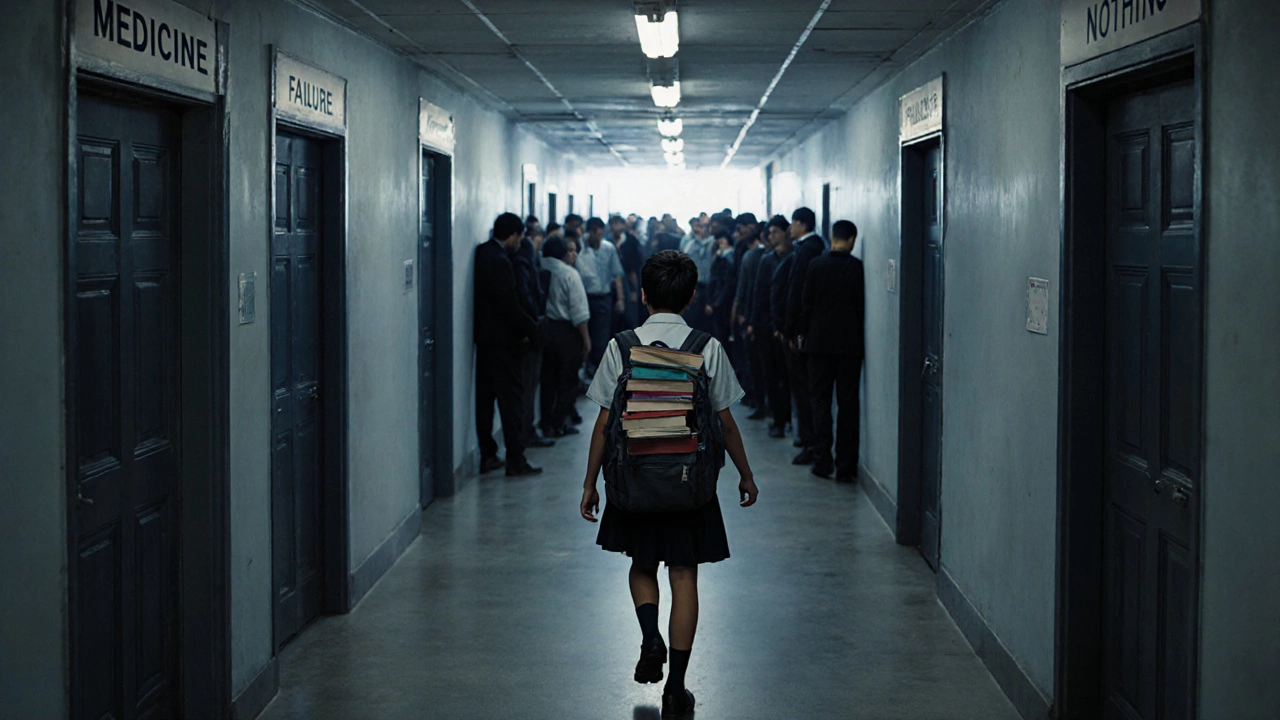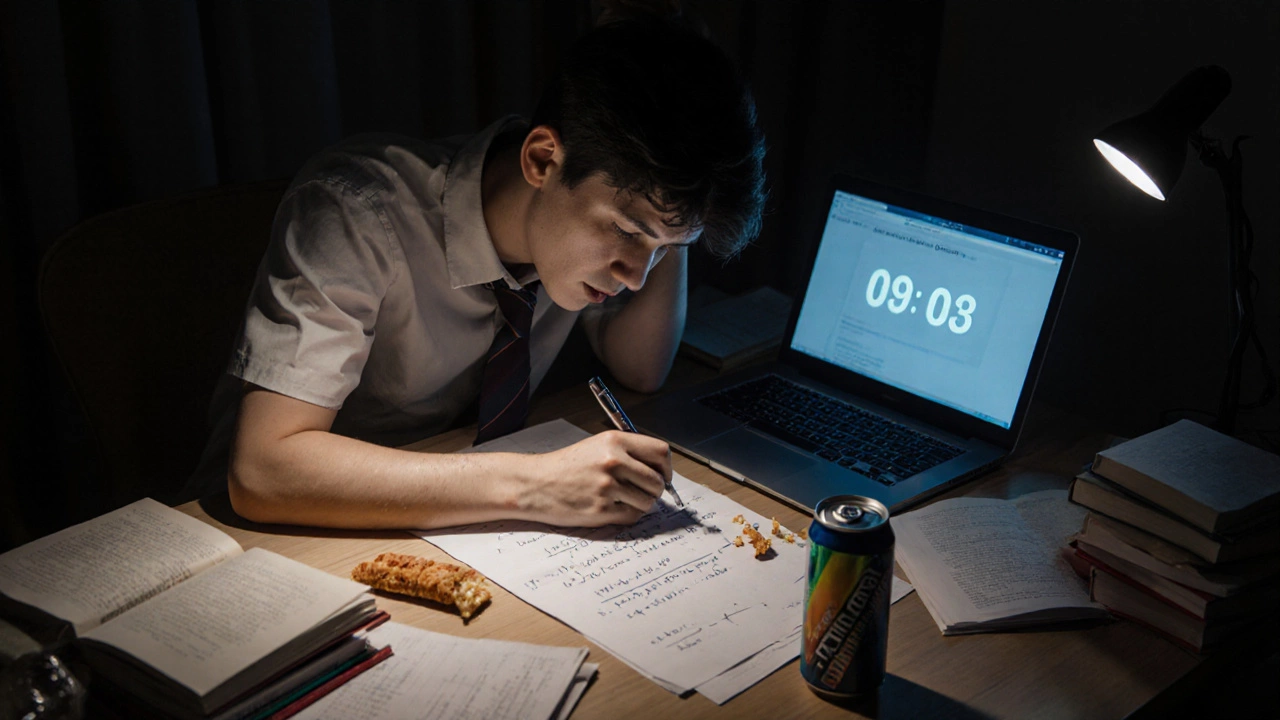Syllabus Comparison Tool
Which Education System Matches Your Needs?
Compare key metrics across CBSE, IB, ICSE, and Cambridge to understand their demands, structure, and workloads.
| System | CBSE | IB | ICSE | Cambridge |
|---|---|---|---|---|
| Subjects per student | 5–6 (mandatory) | 6 (3 HL + 3 SL) | 6–7 | 3–4 |
| Teaching hours (Grade 11–12) | ~1,800 | ~2,400 | ~2,000 | ~1,200 |
| Exam format | MCQs + short answers + derivations | Essays + labs + extended research | Long answers + analysis | Essays + problem-solving |
| Pressure source | Competitive exams (JEE/NEET) | University admissions worldwide | Depth of content | High grading standards |
| Weekly study time (avg.) | 40–50 hours | 45–55 hours | 35–45 hours | 30–40 hours |
| Pass rate (Grade 12) | 85–90% | 80% | 88% | 82% |
| Top score difficulty | Extremely high (1% score 95%+) | Extremely high (1% score 40+) | High (rare 95%+) | High (A* is rare) |
Ask any student who’s survived Class 12 under the CBSE board, and they’ll tell you one thing: it’s not just hard-it’s relentless. But is it the hardest in the world? The answer isn’t simple. Some countries design their school systems to build thinkers. Others build warriors. The CBSE syllabus doesn’t just test knowledge-it tests endurance, speed, and precision under pressure. And it’s not alone in the race.
What makes a syllabus "hardest"?
There’s no official ranking for the world’s hardest school syllabus. But if you look at what students actually face-hours of study, depth of content, exam pressure, and consequences of failure-you start seeing patterns. The hardest syllabi aren’t just long. They’re dense, fast-paced, and unforgiving. They demand mastery in multiple subjects simultaneously, often with no room for error.
Take the CBSE Class 12 Physics paper. In 2024, the average time per question was under two minutes. Students had to solve numerical problems, write derivations, and explain concepts-all while managing time. One wrong step in a 5-mark derivation and you lose half the marks. No partial credit for effort. That’s the reality.
CBSE: The pressure cooker of India
The Central Board of Secondary Education (CBSE) covers over 20,000 schools in India and abroad. Its syllabus is designed for uniformity and high-stakes exams like JEE Main and NEET. That means everything is tuned for competition.
Class 11 and 12 syllabi in Physics, Chemistry, and Mathematics are almost identical to the first year of engineering colleges. Students learn calculus-based mechanics in Grade 11. Organic chemistry reactions aren’t memorized-they’re applied. Biology students memorize over 1,200 anatomical terms and processes. And they do it all while balancing board exams, competitive prep, and coaching classes.
CBSE doesn’t just test understanding. It tests recall under fatigue. The exam pattern rewards speed. A student who spends five minutes on a 2-mark question is already behind. There’s no time for deep thinking. You’re trained to recognize patterns, apply formulas, and move on.
And the stakes? For millions, Class 12 results determine whether they get into medical school, engineering, or nothing at all. No safety net. No retakes. One shot.
IB: Depth over breadth-but at what cost?
The International Baccalaureate (IB) Diploma Programme is often called the gold standard. It’s rigorous, yes. But not because it’s overwhelming. It’s because it’s deep.
IB students take six subjects: three at Higher Level (HL) and three at Standard Level (SL). HL subjects require 240 teaching hours-nearly double what CBSE offers. Students write a 4,000-word Extended Essay. They complete 150 hours of Creativity, Activity, Service (CAS). They take Theory of Knowledge-a philosophy class that asks them to question how they know what they know.
IB doesn’t ask you to memorize 50 chemical reactions. It asks you to design an experiment to test one, analyze the data, and defend your methodology. It doesn’t test how fast you solve math problems. It tests whether you can explain why the formula works.
But here’s the catch: IB students often spend 40-50 hours a week on schoolwork. Sleep is a luxury. Many burn out by Grade 12. The pass rate for the full diploma is around 80%, but the percentage of students scoring 40+ out of 45? Less than 10%. That’s elite. But it’s not for everyone.

ICSE: The hidden heavyweight
Many people overlook the Indian Certificate of Secondary Education (ICSE). But if you’ve ever seen an ICSE English paper, you know why it’s feared.
ICSE demands advanced literacy. In Grade 10, students read Shakespearean texts, analyze poetry with symbolic interpretation, and write essays with structured arguments-no bullet points, no shortcuts. Their Science papers include long-answer questions that require detailed explanations, not just formulas.
Mathematics is more conceptual than CBSE. History and Geography require essay writing based on primary sources. The syllabus is broader, more detailed, and less predictable. There’s no pattern to memorize. You have to understand.
ICSE students often score lower than CBSE students on standardized tests-not because they’re less capable, but because they’re not trained for multiple-choice speed. They’re trained for depth. And that makes them stronger writers, thinkers, and researchers.
Cambridge (IGCSE & A-Levels): The global benchmark
Cambridge International’s IGCSE and A-Level programs are used in over 160 countries. They’re known for academic freedom and high standards.
At the A-Level, students typically take only 3-4 subjects. But each subject is intense. A-Level Physics includes university-level topics like quantum mechanics and thermodynamics. A-Level Economics requires statistical analysis and model interpretation. A-Level Biology includes dissection labs and advanced genetics.
Exams are essay-heavy and application-based. You can’t guess your way through. There are no easy multiple-choice questions. You have to explain, justify, and connect ideas. The grading is strict. A 75% score in the UK might be an A*. In India, it’s considered brilliant.
But here’s the twist: Cambridge students often have more time. They’re not cramming for 10 subjects at once. They focus. That’s why many IB and CBSE students switch to Cambridge in Grade 11-to escape the overload.

Why CBSE stands out as the most demanding
Let’s compare the numbers:
| Feature | CBSE | IB | ICSE | Cambridge A-Level |
|---|---|---|---|---|
| Subjects per student | 5-6 (mandatory) | 6 (3 HL + 3 SL) | 6-7 | 3-4 |
| Teaching hours (Grade 11-12) | ~1,800 | ~2,400 | ~2,000 | ~1,200 |
| Exam format | MCQs + short answers + derivations | Essays + labs + extended research | Long answers + analysis | Essays + problem-solving |
| Pressure source | Competitive exams (JEE/NEET) | University admissions worldwide | Depth of content | High grading standards |
| Weekly study time (avg.) | 40-50 hours | 45-55 hours | 35-45 hours | 30-40 hours |
| Pass rate (Grade 12) | 85-90% | 80% | 88% | 82% |
| Top score difficulty | Extremely high (1% score 95%+) | Extremely high (1% score 40+) | High (rare 95%+) | High (A* is rare) |
CBSE doesn’t have the most teaching hours. It doesn’t have the most essays. But it has something no other system has: the combination of extreme volume, high competition, and zero tolerance for mistakes.
CBSE students are expected to master university-level content while competing with over 1.5 million others for 10,000 medical seats. They study 12-14 hours a day. They take mock tests every week. They sleep less. They sacrifice hobbies. They don’t have the luxury of choosing subjects they love. They take what’s required to get into college.
That’s not just hard. It’s systemic.
Who thrives under CBSE? Who doesn’t?
Students who thrive under CBSE are disciplined, fast learners, and good at pattern recognition. They don’t need to understand every concept deeply-they need to know how to apply it under time pressure. They’re resilient. They’ve learned to manage stress as a skill.
But students who need time to think, who learn best through discussion or creativity, often burn out. They’re labeled "average" when they’re just mismatched with the system.
IB and Cambridge suit students who want to explore ideas. ICSE suits those who love writing and analysis. CBSE suits those who need a clear path to a high-stakes career.
The real question isn’t "which is hardest?"-it’s "which suits you?"
There’s no single "hardest" syllabus. But if you define "hardest" as the one that demands the most from students with the least margin for error, then CBSE wins.
It’s not about intelligence. It’s about endurance. It’s about surviving a system designed to filter out the majority. And millions do. They go on to become doctors, engineers, scientists. They don’t just pass exams-they break barriers.
But if you’re choosing a curriculum for your child, don’t pick the hardest. Pick the one that matches their strengths, their pace, and their future.
Because the world doesn’t need more burned-out geniuses. It needs people who can think, adapt, and keep going-not just survive, but thrive.
Is CBSE the hardest syllabus in India?
Yes, among Indian boards, CBSE is widely considered the most demanding due to its high syllabus volume, fast-paced exams, and direct link to competitive exams like JEE and NEET. ICSE is deeper in content, but CBSE demands speed, precision, and endurance under extreme pressure.
How does CBSE compare to IB for university admissions?
IB is globally recognized and preferred by top universities like Oxford, Harvard, and Stanford because of its holistic approach. CBSE is accepted everywhere, but students often need higher scores and additional qualifications (like SAT or IELTS) to compete. IB students have an edge in essays and research, while CBSE students excel in technical subjects and problem-solving speed.
Can a CBSE student switch to IB or Cambridge later?
Yes, many CBSE students switch to IB or Cambridge in Grade 11, especially if they plan to study abroad. The transition is tough because IB and Cambridge focus on critical thinking over rote learning. But students who adapt well often perform better in university due to stronger foundational knowledge.
Why do CBSE students score lower in international exams like SAT?
CBSE focuses on depth in science and math but gives less emphasis on English writing, critical reading, and analytical reasoning-skills tested heavily in SAT and ACT. CBSE students often need 6-12 months of targeted prep to bridge this gap.
Is the CBSE syllabus changing to reduce pressure?
Yes. CBSE has reduced syllabus content by 20-30% since 2021, especially in subjects like Science and Social Science. They’ve also introduced competency-based questions and removed rote memorization-heavy sections. But the pressure hasn’t decreased because competitive exams still demand the same level of mastery.
